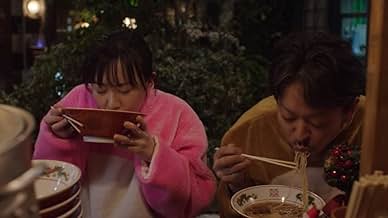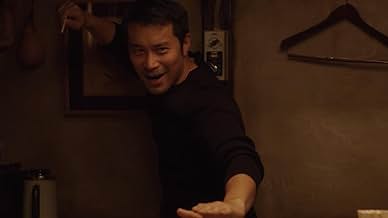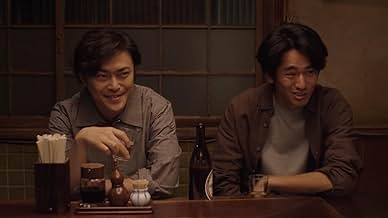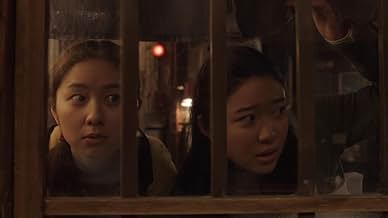Midnight Diner: Tokyo Stories
Originaltitel: Shin'ya shokudô: Tokyo Stories
Füge eine Handlung in deiner Sprache hinzuAn anthology of human relationship stories connected by the only open in the wee hours diner the characters frequent. Resolutions are often facilitated by the owner/chef.An anthology of human relationship stories connected by the only open in the wee hours diner the characters frequent. Resolutions are often facilitated by the owner/chef.An anthology of human relationship stories connected by the only open in the wee hours diner the characters frequent. Resolutions are often facilitated by the owner/chef.
Folgen durchsuchen
Empfohlene Bewertungen
This Japanese series is beautiful and interesting, simple and wonderful, music was indescribable, Certainly l recommend it
The Master who runs the fabulous 12-seat Midnight Diner has a zen-like all-knowing calm - and almost magically can conjure up dozens of different dishes in his tiny kitchen.
Every food serving takes us into wonderful human stories about our foibles, mistakes, regrets and second chances.
As we get to know the diner's regulars, we become regulars too - glorying in the calm oasis this eatery and its people offer us.
The bite-sized stories run less than 30 minutes and it's easy to binge and get through the series all too quickly. We've now devoured all 50 episodes but are still hungry for a new season of these wonderful tales.
Here's hoping Netflix green lights a sixth season - it's the perfect recipe for our disrupted world.
Every food serving takes us into wonderful human stories about our foibles, mistakes, regrets and second chances.
As we get to know the diner's regulars, we become regulars too - glorying in the calm oasis this eatery and its people offer us.
The bite-sized stories run less than 30 minutes and it's easy to binge and get through the series all too quickly. We've now devoured all 50 episodes but are still hungry for a new season of these wonderful tales.
Here's hoping Netflix green lights a sixth season - it's the perfect recipe for our disrupted world.
10redafiz
Each episode have its own story which is beautiful and heartwarming. I wish to know more about the master, how he open the diner at the beginning, his own background story, why is he still single (he must have his own family tho).. The master looks so mature, he knows everything.. Wish I have someone like him to talk to..
I dont even skip the intro, the soundtrack and masters voice is sooooooo soothing... Makes me feel relief...
I dont even skip the intro, the soundtrack and masters voice is sooooooo soothing... Makes me feel relief...
Midnight Diner: Tokyo Stories (Japanese: Shinya shokudo) (2016)
Creator: Yaro Abe
Watched: September 2018
Rating: 8/10
"When people finish their day and hurry home, my day starts. My diner is open from midnight to seven in the morning. They call it "Midnight Diner". Pork Miso Soup, Beer, Sake, Shochu. That's all I have on my menu. But I make whatever customers request, as long as I have the ingredients for it. That's my policy.Do I even have customers? More than you would expect."
Not sure what Master is talking about! An intimate 12 seat Izakaya in the Shinjuku, Tokyo district with custom made scrumptious eats served during nocturnal hours? Seems like a dream of a place. Called simply "Meshiya", Japanese for "Diner", it would certainly be one of those unassuming hole-in-the-wall hidden gems that become a home away from home; a refuge of sorts. A night owl foodie lover of stories, this is somewhere I, for one, would undoubtedly frequent.
Anthology style episodes. (Although Japan has its own adaptations, in the form of both show(s) and a feature length film.) Quite ingenious how one particular dish of food (as indicated in episode title) is creatively integrated as a motif in the story, but does not become contrived or overwhelm as the centerpiece. Artfully and subtly exemplifies how good food, especially lovingly prepared, can be an anodyne and nutriment for not only our bodies but our minds.
"People finish their day and hurry home. but sometimes they don't want to go straight back home. So, they drop in somewhere else on the way home."
Who is Master? Nameless and storyless. (He has s prominent scar, though. Oh how I want to know his story. Guess I have to investigate the manga this show is based on.) Therapist. (Like any good therapist, he listens more than he talks, but when he speaks, one should pay attention, for it is usually good advice or a thoughtful question.) Storyteller. (Narrates and tells us what happens sometimes rather than show.) Nourisher. (Serves you what always turns out to be comfortable food, and for better or worse, alcohol. Although he does have a three drink maximum rule.) Observer. (He can be seen standing and waiting, listening surreptitiously, behind the kitchen curtain before coming out with the beer or food.) Mediator. (He remains impartial- though not disinterested- in the arguments that take place in his diner and sends any heightened altercations outside.)
There are some regulars at the Midnight Diner, including: the three (annoying) girls that gossip and are akin to a Greek Chorus; Chu, an elderly man always wearing a baseball cap who gambles at the horse races and has an affinity for alcohol, the younger man always seen with him; Kosuzu, the cross-dressing owner; and the almost adorably awkward police officer. But, for the most part, each episode introduces a new character or characters in their own bite-sized story, never to appear again.
The show was not perfect, though. First, the stories themselves were all rather kosher. While it was nice to see the genuine slice of life aspect, the show would have benefited from a few risks. Stories were not boring, but a little lulling at times. Secondly, there was a noticeable gaping void where Master's story should have been. Whether an oversight or intentional mysterious angle, it really did not work here. Also, the folksy soundtrack often does not quite suit what was being seen. One wishes that they invested more in what could be the extra ingredient this show needed.
As is not uncommon in Eastern Cinema (based in theater and therefore less concerned with that fourth wall), the featured characters say "Goodnight" to us. Credits roll- a recommended extra couple minutes for the endearing stills of the episode's eponymous dish and various outtakes. And the "This Story is Fiction" shot, taken in a different seeing for each episode.
All in all, a delightful series that needs some more episodes readily available. Perfect as the amuse-bouche or even appetizers, but not quite ready for Michelin Stars.
"When people finish their day and hurry home, my day starts. My diner is open from midnight to seven in the morning. They call it "Midnight Diner". Pork Miso Soup, Beer, Sake, Shochu. That's all I have on my menu. But I make whatever customers request, as long as I have the ingredients for it. That's my policy.Do I even have customers? More than you would expect."
Not sure what Master is talking about! An intimate 12 seat Izakaya in the Shinjuku, Tokyo district with custom made scrumptious eats served during nocturnal hours? Seems like a dream of a place. Called simply "Meshiya", Japanese for "Diner", it would certainly be one of those unassuming hole-in-the-wall hidden gems that become a home away from home; a refuge of sorts. A night owl foodie lover of stories, this is somewhere I, for one, would undoubtedly frequent.
Anthology style episodes. (Although Japan has its own adaptations, in the form of both show(s) and a feature length film.) Quite ingenious how one particular dish of food (as indicated in episode title) is creatively integrated as a motif in the story, but does not become contrived or overwhelm as the centerpiece. Artfully and subtly exemplifies how good food, especially lovingly prepared, can be an anodyne and nutriment for not only our bodies but our minds.
"People finish their day and hurry home. but sometimes they don't want to go straight back home. So, they drop in somewhere else on the way home."
Who is Master? Nameless and storyless. (He has s prominent scar, though. Oh how I want to know his story. Guess I have to investigate the manga this show is based on.) Therapist. (Like any good therapist, he listens more than he talks, but when he speaks, one should pay attention, for it is usually good advice or a thoughtful question.) Storyteller. (Narrates and tells us what happens sometimes rather than show.) Nourisher. (Serves you what always turns out to be comfortable food, and for better or worse, alcohol. Although he does have a three drink maximum rule.) Observer. (He can be seen standing and waiting, listening surreptitiously, behind the kitchen curtain before coming out with the beer or food.) Mediator. (He remains impartial- though not disinterested- in the arguments that take place in his diner and sends any heightened altercations outside.)
There are some regulars at the Midnight Diner, including: the three (annoying) girls that gossip and are akin to a Greek Chorus; Chu, an elderly man always wearing a baseball cap who gambles at the horse races and has an affinity for alcohol, the younger man always seen with him; Kosuzu, the cross-dressing owner; and the almost adorably awkward police officer. But, for the most part, each episode introduces a new character or characters in their own bite-sized story, never to appear again.
The show was not perfect, though. First, the stories themselves were all rather kosher. While it was nice to see the genuine slice of life aspect, the show would have benefited from a few risks. Stories were not boring, but a little lulling at times. Secondly, there was a noticeable gaping void where Master's story should have been. Whether an oversight or intentional mysterious angle, it really did not work here. Also, the folksy soundtrack often does not quite suit what was being seen. One wishes that they invested more in what could be the extra ingredient this show needed.
As is not uncommon in Eastern Cinema (based in theater and therefore less concerned with that fourth wall), the featured characters say "Goodnight" to us. Credits roll- a recommended extra couple minutes for the endearing stills of the episode's eponymous dish and various outtakes. And the "This Story is Fiction" shot, taken in a different seeing for each episode.
All in all, a delightful series that needs some more episodes readily available. Perfect as the amuse-bouche or even appetizers, but not quite ready for Michelin Stars.
As someone who doesn't speak or understand any Japanese, has never been to Japan and knows virtually nothing about the culture, this series charmed the hell out of me. It's as beautifully shot as it is scored, and it really does have a feeling of craftsmanship about it. The premise - an anthology of human stories, linked together by a graveyard shift diner hidden away in the midst of Shinjuku that caters to both a cast of regulars and one-off visitors - and the construction of each individual tale is charming without falling too far into twee familiarity, and each story is perfectly realised.
Kaoru Kobayashi towers as the quietly sympathetic Master, who will cook any dish for anyone, so long as they bring him the ingredients... which gives the show its neat device of theming each episode around a particular recipe. Whether as a symbol of or conduit for togetherness, comfort, romantic or familial relationships, or a Proust-like trigger for bittersweet memories that can never be entirely recaptured, food provides a delicately illustrated metaphor throughout the series.
The issues that the Master's customers face are frequently weighty and almost always universal, but the tone is light enough to take it all in stride and, if the characters feel like archetypes, it's because they're meant to be drawn broadly. Part of the show's whole concept is, just like the remembered taste of a childhood delicacy, to evoke a sense of otherworldly nostalgia - to create something unreal in the liminal space of midnight, in the idea of an oasis untouched by the city; the otherness that strips away illusion - and that evokes feelings rather than the realism of minutiae.
Perhaps the show is at its least successful when it dips into magic realism, but at its core this is a collection of great stories, told well and seasoned with enough humour and enough pathos to satisfy any appetite.
Kaoru Kobayashi towers as the quietly sympathetic Master, who will cook any dish for anyone, so long as they bring him the ingredients... which gives the show its neat device of theming each episode around a particular recipe. Whether as a symbol of or conduit for togetherness, comfort, romantic or familial relationships, or a Proust-like trigger for bittersweet memories that can never be entirely recaptured, food provides a delicately illustrated metaphor throughout the series.
The issues that the Master's customers face are frequently weighty and almost always universal, but the tone is light enough to take it all in stride and, if the characters feel like archetypes, it's because they're meant to be drawn broadly. Part of the show's whole concept is, just like the remembered taste of a childhood delicacy, to evoke a sense of otherworldly nostalgia - to create something unreal in the liminal space of midnight, in the idea of an oasis untouched by the city; the otherness that strips away illusion - and that evokes feelings rather than the realism of minutiae.
Perhaps the show is at its least successful when it dips into magic realism, but at its core this is a collection of great stories, told well and seasoned with enough humour and enough pathos to satisfy any appetite.
Wusstest du schon
- WissenswertesThis is the first season of the Midnight Diner franchise that broadcasted on Netflix with the sub-title Tokyo Stories after Netflix failed to acquire the license of the first three seasons of this franchise.
- VerbindungenVersion of Midnight Diner: Tokyo Stories (2009)
Top-Auswahl
Melde dich zum Bewerten an und greife auf die Watchlist für personalisierte Empfehlungen zu.
Details
- Erscheinungsdatum
- Herkunftsland
- Offizielle Standorte
- Sprache
- Auch bekannt als
- Quán Ăn Đêm: Những Câu chuyện ở Tokyo
- Produktionsfirma
- Weitere beteiligte Unternehmen bei IMDbPro anzeigen
- Laufzeit24 Minuten
- Farbe
- Seitenverhältnis
- 1.78 : 1
Zu dieser Seite beitragen
Bearbeitung vorschlagen oder fehlenden Inhalt hinzufügen

Oberste Lücke
What is the German language plot outline for Midnight Diner: Tokyo Stories (2016)?
Antwort























